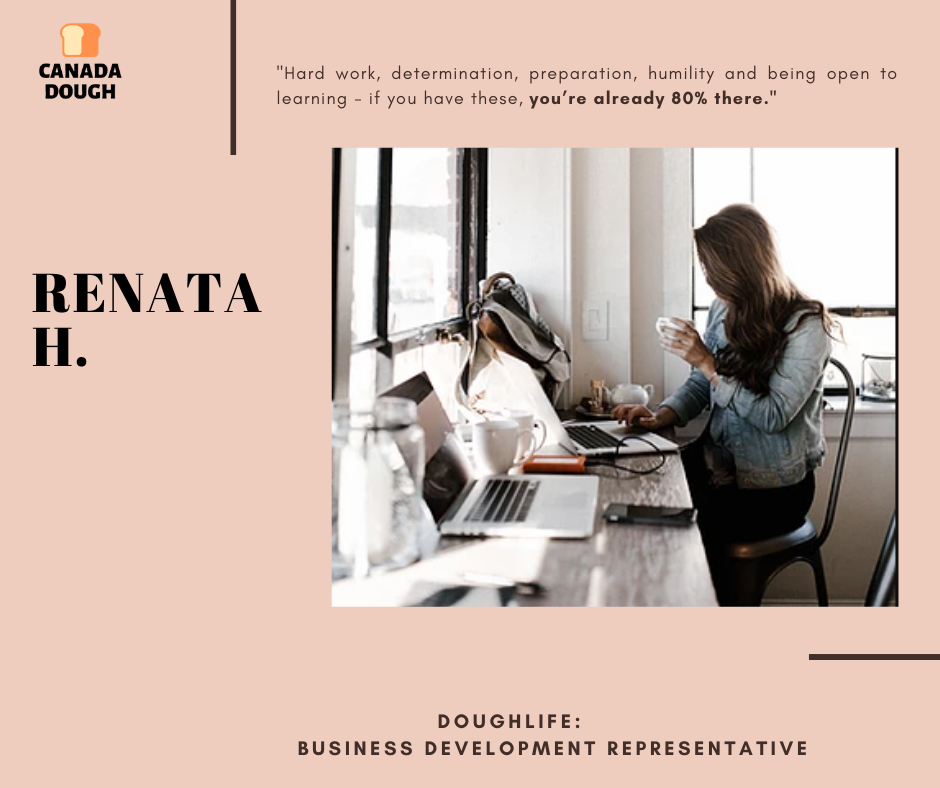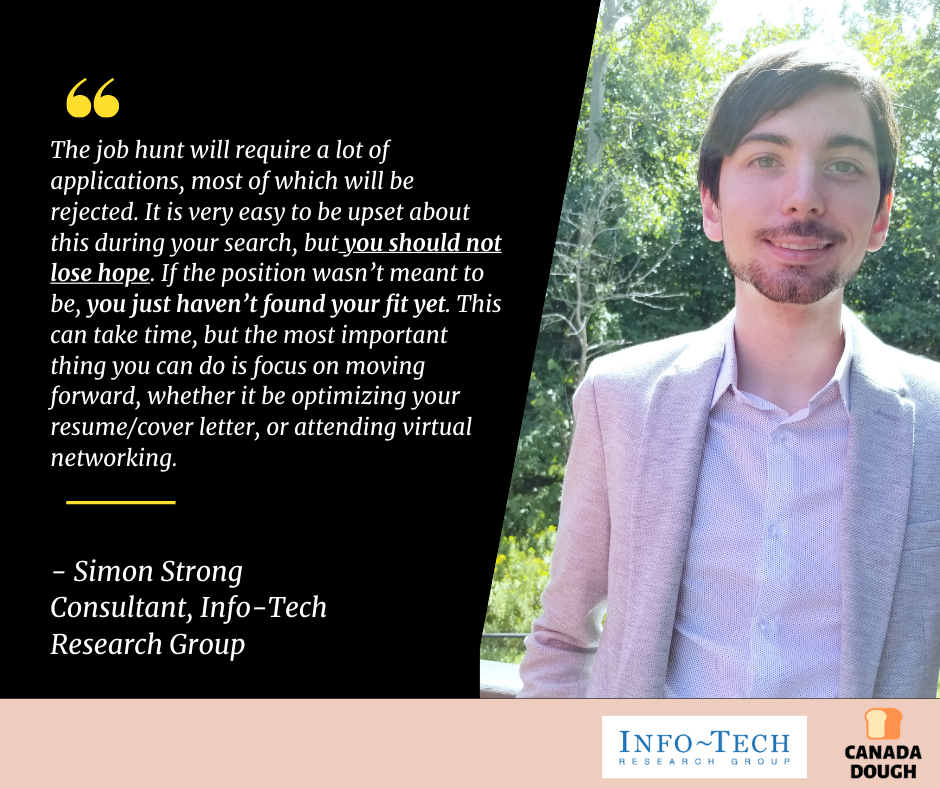Dough Life: A Day in the Life of a Business Development Representative
- Canada Dough

- Nov 3, 2020
- 5 min read
Name: Renata
Role: Business Development Representative

About Me
My name is Renata and I'm a Business Development Representative at a Toronto software company, as well as a Schulich BBA (Bachelor of Business Administration) alumnus. At work, I reach out to corporate sales leaders to educate them on how our software solution can help grow their business, and enable their team to be more productive. Outside of work, you'll find me crushing board games, binging personal finance videos, and trying out hole-in-the-wall eateries around Toronto.
1. What is your role? What does your job entail?
I am a Business Development Representative at a SaaS (Software as a Service) company. In my job, I focus on B2B sales, reaching out to potential customers which are teams at large corporations. My outreach to prospects typically involves e-mailing, cold-calling, LinkedIn messages, videos and more. My job is gain interest and book meetings with prospects for our Account Executives who handle the rest of the sales cycle.
2. What does a typical day look like for you? How is your work-life balance?
Overall, I have a pretty great work-life balance. I typically work 9AM to 6PM with some extra hours when needed. An average day may consist of any of these:
A meeting with the rest of the SDR team to get a pulse check on how things are going, share about our challenges and/or strategies that are working well
Prospecting (finding potential customers) and sending out emails and LinkedIn messages to my prospects
An hour of cold-calling
A meeting with a prospect to hear about their needs and share how our software might help
Depending on the day, I’ll also have meetings with my Account Executive and our Customer Success team to talk strategy and get aligned on how we’re tackling priority accounts (companies)
Outside of the regular team meetings, one of the great parts about my job is that I have the flexibility to structure my day however I want. In this job, what really matters at the end of the day is your results - how you perform against your targets - and not the hours you work.
3. What appealed to you about this particular organization?
I work for a software company, which was a perfect fit in terms of what I was looking for. I knew I wanted to be at an organization where I would be able to be part of a tight-knit community, which would also have set processes in place and experienced leaders who I could learn from.
Before applying to this company, I did a ton of research and it checked off all my boxes. The company had stellar reviews on Glassdoor and the product itself also had top-notch customer reviews. On social media, I could see that it had a more casual and fun culture. I also networked with a number of employees at this company during the application process and was struck by the passion that everyone had for their job, and how much they loved the people they work with.
Finally, I very much identified with the company values and its work-life balance. Every employee is given an educational budget for personal development, and ample time for vacation and mental health breaks.
4. What aspects of your job do you enjoy? What keeps you up at night?
I enjoy being able to strategize how to tackle my accounts (prospective customer companies), whether it’s by digging for valuable information through company reports or identifying potential decision-makers who might be the right customer personas. It’s a lot like solving a puzzle or going on an Easter egg hunt. I also enjoy the conversations I have with prospects - you never know what to expect and there seems to be a new challenge everyday, but that’s what makes life interesting.
What keeps me up at night is whether I’m going to hit my targets or whether a certain meeting will turn out well, but I suppose that’s the norm for anyone in sales.
RECRUITMENT PROCESS
5. What would the ideal candidate look like? Describe any relevant skills, experiences, traits, etc.
The ideal candidate would be a great communicator - able to handle objections, communicate creatively and concisely over email, and think on their feet during calls. It’s critical to be able to have empathy for prospects / customers. Essentially, be able to understand their priorities and challenges in their work, and show how your offering aligns with their needs.
Previous sales experience is ideal, but perhaps not a must-have since the SDR role is considered entry-level. Not all of my coworkers came from a sales background, so it seems that what’s more important is being able to show how your skills and experiences makes you a unique asset, and that you can bring a lot to the table in this role.
Some must-have traits for this job are: resilience (you will hear negative responses on a daily basis), empathy, results-oriented, self-motivated, curious, focused and organized.
6. What did the application/interview process look like for you? How did you get your foot in the door?
The application process typically involves submitting an application (resume and cover letter), a phone interview, and two in-person interviews. The interviews were a mix of behavioural questions, a skills test, a take-home assignment, and a culture fit interview.
I got my foot in the door by reaching out to my future manager on LinkedIn. Seeing that she was hiring for my role, I contacted her to ask for a coffee chat. Although we did not go for coffee, I was able to get a quick phone call. While that conversation only took 15 minutes, by the end of it, I was invited to interview in-person the following week.
7. How did you stand out in the application process?
Quite frankly, sales involves creative outreach to prospects through different channels and my future manager liked that I was able to identify her as a decision-maker in the hiring process, and reached out to her over LinkedIn.
During the interview process, I was able to stand out by preparing as much as I could. I had a thorough understanding of the role and the company as I had in-depth conversations with two employees beforehand, and I did a lot of research online. My interviewers told me they appreciated the amount of preparation I had done, which ultimately paid off.
8. Looking back, was there anything you could have improved during your application process, or mistakes that you noticed other applicants had made?
I interviewed alone and did not have any group interviews, so I would not be able to speak on the second point. Looking back, I could have improved in some aspects in my answers for the skills test. However, this was not due to lack of preparation, as any improvements that could have been made would have come from more experience or by learning through critical feedback.
9. Were there any surprises in your job search experience or things you wished you had known earlier?
I was somewhat surprised by the culture fit interview, as I was not expecting it and had not heard much about it until I was called to it. The culture fit interview is not one you can be fully prepared for, although it is about sharing and reflecting on your experiences. It turned out to be a positive experience and certainly not a cause for anxiety. It was fun being able to share about myself with my interviewers (when else can you talk about yourself for 2 hours straight?) and being able to connect on a more personal level.
10. What advice would you give to someone who wants to break into your role/program?
Hard work, determination, preparation, humility and being open to learning - if you have these, you’re already 80% there.
Recognize that sales can be a grind and you will have emotional ups and downs - are you prepared for this?
Be ambitious but don’t beat yourself up when things don’t go your way (they won’t 90% of the time - you’ll hear a lot of “no’s”). Stay optimistic and take care of your mental health.




Comments